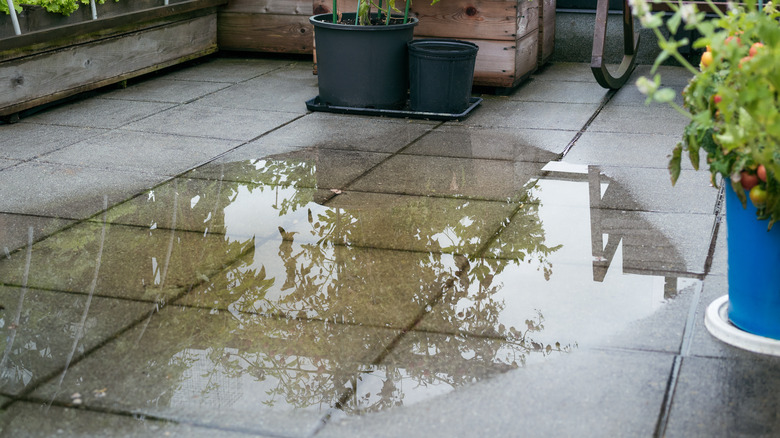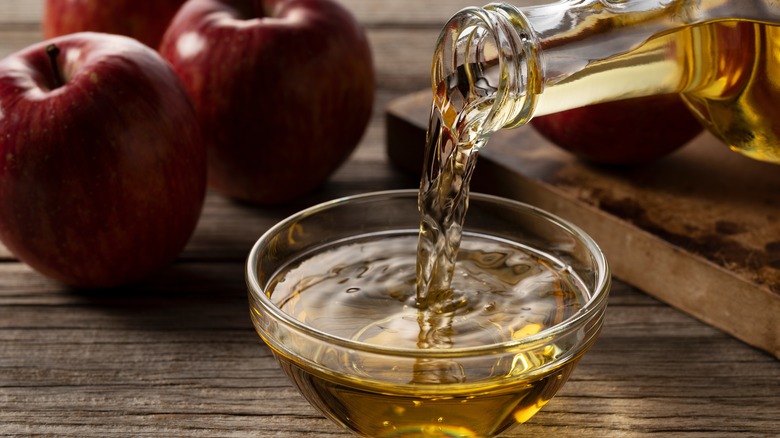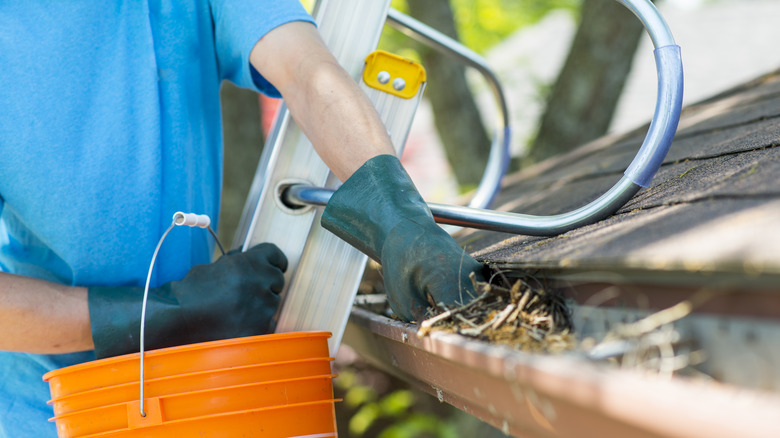Use A Common Ingredient To Eradicate Mosquito Larvae In Standing Water On Your Patio
Having mosquitoes swarming your patio and biting you while you're trying to enjoy your outdoor space is a nuisance. Puddles are common sights on any patio, and these can be breeding grounds for mosquitoes, which lay their eggs in standing freshwater. Surprisingly, if you have to deal with the pests making homes out of your patio puddles, a little apple cider vinegar can help to get rid of mosquitoes. Emma Grace Crumbley, an entomologist with Mosquito Squad, spoke exclusively with House Digest about the efficacy of this DIY pest control solution: "Apple cider vinegar is acidic and can lower the pH of freshwater bodies, making the water more acidic," she said. "Lower pH can disrupt the development of mosquito larvae and kill them, depending on the intensity of the water's acidity." By changing the acidity of the water, you can kill mosquitoes before they start flying and biting.
While some mosquitoes only lay eggs in freshwater, other kind's larvae can survive in water that's a bit salty. Because of this, apple cider vinegar may have varying results on different types of mosquitoes. Additionally, Crumbley explained that this method is best suited for very small bodies of water, such as puddles on your patio or clogged gutters and downspouts. This is because you'd need a ton of apple cider vinegar to get the correct acidity level in places with larger volumes of water.
How to kill mosquito larvae with apple cider vinegar
Entomologist Emma Grace Crumbley told House Digest exclusively that a solution of 85% water and 15% apple cider vinegar should be able to eliminate mosquito larvae in approximately 24 hours. She recommended 19 ounces, or about 2 ½ cups, of apple cider vinegar for every gallon of water to ensure the mosquitoes will be affected. Unfortunately, there are some downsides to this DIY pest control solution. According to Crumbley, this DIY pest control hack could take longer than expected and needs consistent upkeep. "At a minimum, control might be achieved in 24 hours, but environmental conditions like rain, humidity, temperature, and sunlight can affect its efficiency," she said.
This method also may not yield the same results every time. "Some mosquitoes are more resilient than others," Crumbley said. "While it's true that most mosquitoes need fresh water to survive, some are equipped to live in brackish and saltier bodies of water. Since they can live in harsher aquatic environments, an apple cider vinegar solution may not be as effective as other control options." If you decide to try this hack, make sure that you are only adding your vinegar to extremely small puddles, as Crumbley warned that this common ingredient can be harmful for pets and other wildlife, whether they're drinking the water or swimming in it. While apple cider vinegar is capable of killing mosquito larvae, it may not be the best option according to our expert.
Expert tips for eradicating mosquito larvae
While pouring a bit of apple cider vinegar into small puddles on your patio will kill growing mosquitoes, it could be harmful if used in birdbaths and there may be better options for getting rid of these pests in other situations (see our tips for keeping mosquitos out of your birdbath). Emma Grace Crumbley told House Digest that maintaining your space by cleaning out any clogged gutters and eliminating standing water can help repel mosquitoes from your yard, garden, and home: "This is the most hazard-free way to reduce and kill mosquito larvae. Mosquito larvae need water to survive, and dumping out standing water causes these wrigglers to dry out and die," she said. Crumbley suggests looking in your gardening supplies, plant pots, wheelbarrows, toys, and other outdoor spaces that might collect water and simply pouring them out.
For those with outdoor water features like ponds near their patios, helping natural predators of mosquito larvae to thrive can kill off these pests, according to Crumbley. "Planting native aquatic and wetland plants near natural water bodies can help increase the number of beneficial animals living nearby," she said. In larger bodies of water or with a higher mosquito population, Crumbley suggests that mosquito bricks, which are made of a natural bacteria, can prove helpful. The larvae will eat the bricks, and the bacteria harms their digestive tracts, killing them. With severe infestations, it may be best to contact a professional pest control service.


